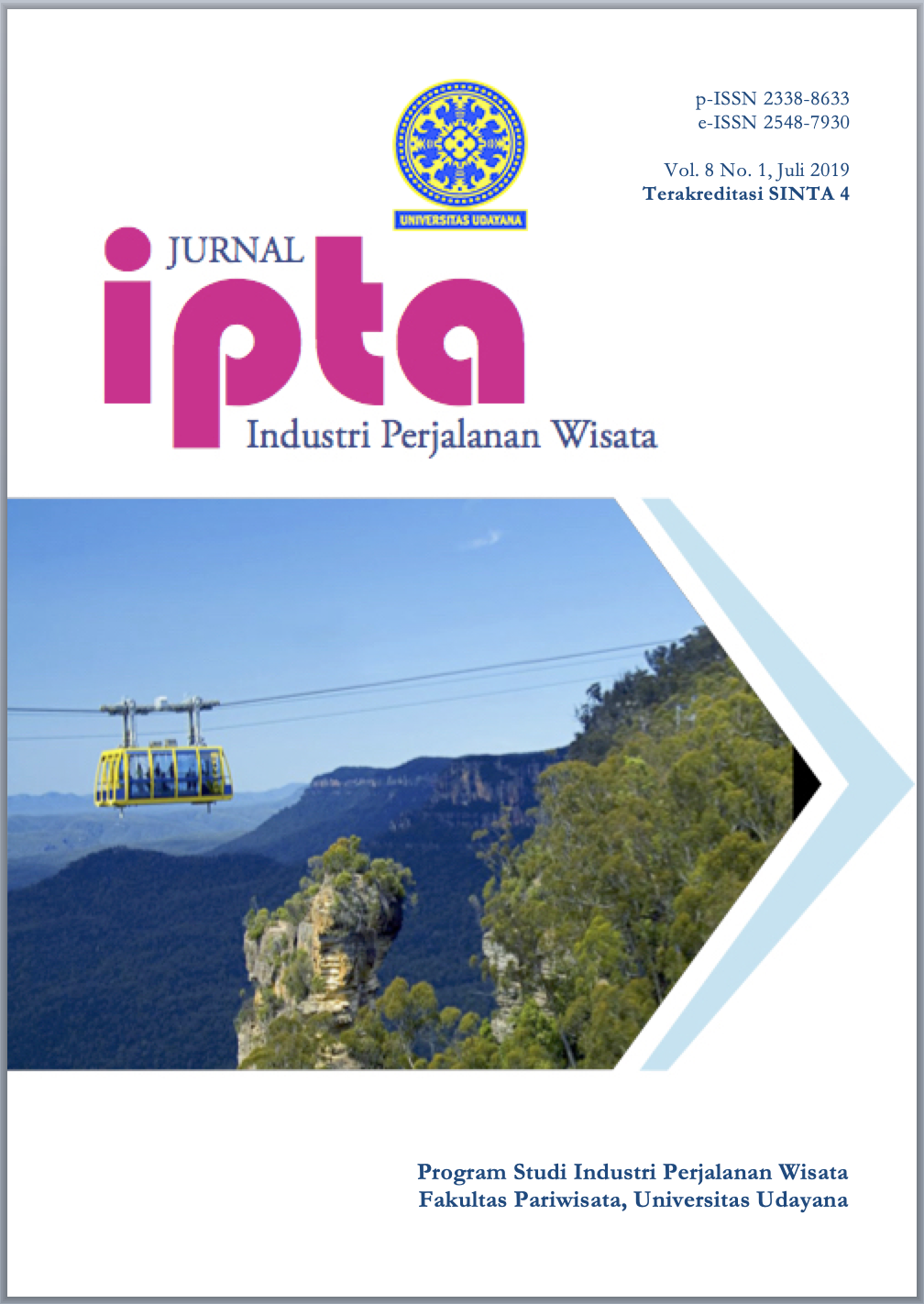FAKTOR YANG MEMPENGARUHI WISATAWAN MEMBELI PRODUK HIJAU DI BALI BUDA UBUD, GIANYAR
Abstract
A green product is one of the breakthrough innovations from the industry especially the tourism industry to achieve sustainable development. There are several reasons the green product is an eco- friendly product such as the use of organic ingredients and the production process. Hence, the objective of this research is to identify the factors affecting tourists’ willingness to pay for the green products at Bali Buda Ubud and what kind of factor that dominantly affects tourists’ willingness to pay Bali Buda Ubud green product. This research uses quantitative data technique analysis which processed by SPSS 23.0 for windows application. The sample is determined by a purposive sampling technique with 105 tourists who buy the green product of Bali Buda Ubud. The data collection techniques are observation, questionnaire, interview, literature review, and documentation. The data analysis techniques from this research are the validity test, reliability test, and factor analysis. The result of this research was that the factors which affect tourist’ willingness to pay green product of Bali Buda Ubud were company profit for environment conservation, green product good for health, the uniqueness of green product packaging, the pride of buying the green product, and knowledge about the green product. The dominant factor which affects tourist’ willingness to pay green product of Bali Buda Ubud was company profit for environment conservation which is seen from the biggest eigenvalue 8.373 and variance presentation 39.872%.
Downloads
References
A, Yoeti, Oka. (1996). Pengantar Ilmu Pariwisata. Bandung: Angkasa.
Biswas, Aindrila. (2016). A Study of Consumers’ Kesediaan Wisatawan Membayar for Green Products. Journal of Advanced Management Science Vol. 4, No. 3, May 2016 doi: 10.12720.
Gurau, C. and Ranchhod, A. (2005). International green marketing: a comparative study of British and Romanian firms. International Marketing Review, Vol. 22 No. 5, pp. 547-561.
Grujic, S., Grujic, R., Petrovic, D., and Gajic, J. (2013) Knowledge of food quality and additives and its impact on food preference. Academy Science, Politics, Technology.12 (2), 215-222.
Hair, et al. 2006. Multivariate Data Analysis 6th Ed. New Jersey : Pearson Education.
Kotchen, M. J. Reiling, S.D. 2000. Environmental attitudes, motivations, and contingentvaluation of nonuse values: a case study involving endangered species. Ecological Economics 32 (2000) 93–107.
Laroche, M., Bergeron, J., Barbaro-Forleo, G., 2001. Targeting consumers who are willing to pay more for environmentally friendly products. J. Consum. Mark. 18 (6), 503–520.
Malik, M.E., Ghafor, M.M., Iqbal, H.K. (2013) “Importance of brand awareness and brand loyalty in assessing purchase intentionof consumer”. International Journal of Business and Social Science. 4 (5), 167-171.
Riorini.S.V. Berliyanti. D.O. (2015). Anteseden Dari Wilingness To Pay A Price Premium Dan Konsekuensinya Terhadap Purchase Intention Of Green Product. Jurnal Manajemen/Volume XIX, No. 03, Oktober 2015: 304-320.
Sugiyono.(2001). Metode Penelitian Kuantitatif, Kualitatif & RND. Bandung:Alfabeta.
Vlosky, R.P., Lucie K. O., and Renee J.F. (1999) A conceptual model of US consumer willingness-to-pay for environmentally certified wood products. Journal of Consumer Marketing. 16 (2), 122-140.
Yaseen, N., Tahira, M., Gulzar, A.,and Anwar, A. (2011) Impact of brand awarenes,perceived quality and customer loyalty on brand profitability and purchase intention:a resellers’ view. Interdisiplinary Journal of Contemporary Research in Business. 3(8), 833-839.

This work is licensed under a Creative Commons Attribution-ShareAlike 4.0 International License.





